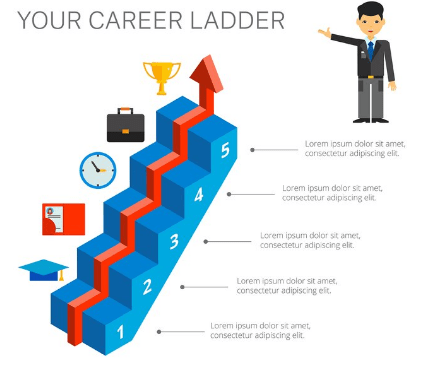Introduction:
Continuous learning, skill development, and strategic planning are all part of the lifelong career growth process. It includes all the acts and steps people take to accomplish their professional objectives, whether those involve moving up the corporate ladder, launching a business, or pursuing a gratifying hobby. In this post, we’ll examine the key elements of career growth and offer practical advice to guide you toward success.
1. Self-Assessment:
Effective professional development starts with understanding your talents, weaknesses, values, and interests. Conduct self-assessments to pinpoint your strengths, preferences, and areas for development. Ask your peers, mentors, or professional evaluation tools for input. Setting worthwhile career goals will be based on this self-awareness.
2. Define Your Goals:
Once you fully grasp who you are, you should decide on your immediate and long-term professional objectives. These objectives must be SMART, specified, measurable, achievable, relevant, and time-limited. Instead of stating, “I want to be successful,” you might add, “I want to become a senior project manager within the next five years.”
3. Constant Education and Skill Growth:
A dedication to lifelong learning is necessary to remain relevant in today’s quickly changing labour market. Determine the information and skill sets required in your industry, then look for ways to learn them. It could entail taking classes, attending workshops, earning certificates, or pursuing graduate degrees.
“Success is not final, failure is not fatal: It is the courage to continue that counts.” – Winston Churchill
4. Establishing Professional Connections:
Networking is an effective method for job advancement. It entails establishing and maintaining connections with peers, mentors, experts in the field, and other professionals. Attend trade shows, seminars, and conferences. Participate in online forums and social media groups related to your industry. In addition to giving you access to useful information and possibilities, networking enables you to keep up with business trends.
5. Taking Chances and Taking Risks:
Take the risk of stepping outside your comfort zone. Considerable growth and professional advancement can result from taking prudent chances and accepting new challenges. Consider lateral moves that offer different viewpoints and skills-building opportunities, volunteer for projects that challenge your abilities, or indicate your interest in leadership positions.
6. Time Management and Work-Life Balance:
Time management skills are essential for career advancement. Set reasonable timelines, order projects by importance, and avoid taking on too much. Additionally, long-term success and well-being depend on maintaining a healthy work-life balance. Burnout and poor performance can result from overworking yourself.
7. Seek out Advice and Modify:
Feedback is an important tool for both professional and personal development. Accept constructive feedback and actively look for ways to get better. Utilise feedback to change your strategy, hone your abilities, and improve your performance.
8. Accept Mistakes as Learning Opportunities:
Any career will inevitably experience failures and disappointments. Consider them as teaching opportunities rather than obstacles. Examine what went wrong, note areas that need improvement, and use these lessons to guide your future work.
9. Keep abreast of market trends:
Keeping up with new trends, technologies, and business practices in your sector is critical. Read industry periodicals, follow thought leaders, and participate in webinars or seminars to stay current. Along with improving your experience, this information will make you a great asset to your company.
10. Flexibility and Adaptability:
Successful career development is characterised by the capacity to adapt to change. Businesses change, and you should, too. Be willing to experiment with various positions, learn new skills, and adapt to novel settings.

Conclusion:
Career development is dynamic and individual, requiring commitment, self-awareness, and consistent work. You can realise your full potential and succeed in your chosen area by adhering to these guidelines and adopting a growth-oriented mindset. Remember that you can always take control of your job and make it something amazing.

